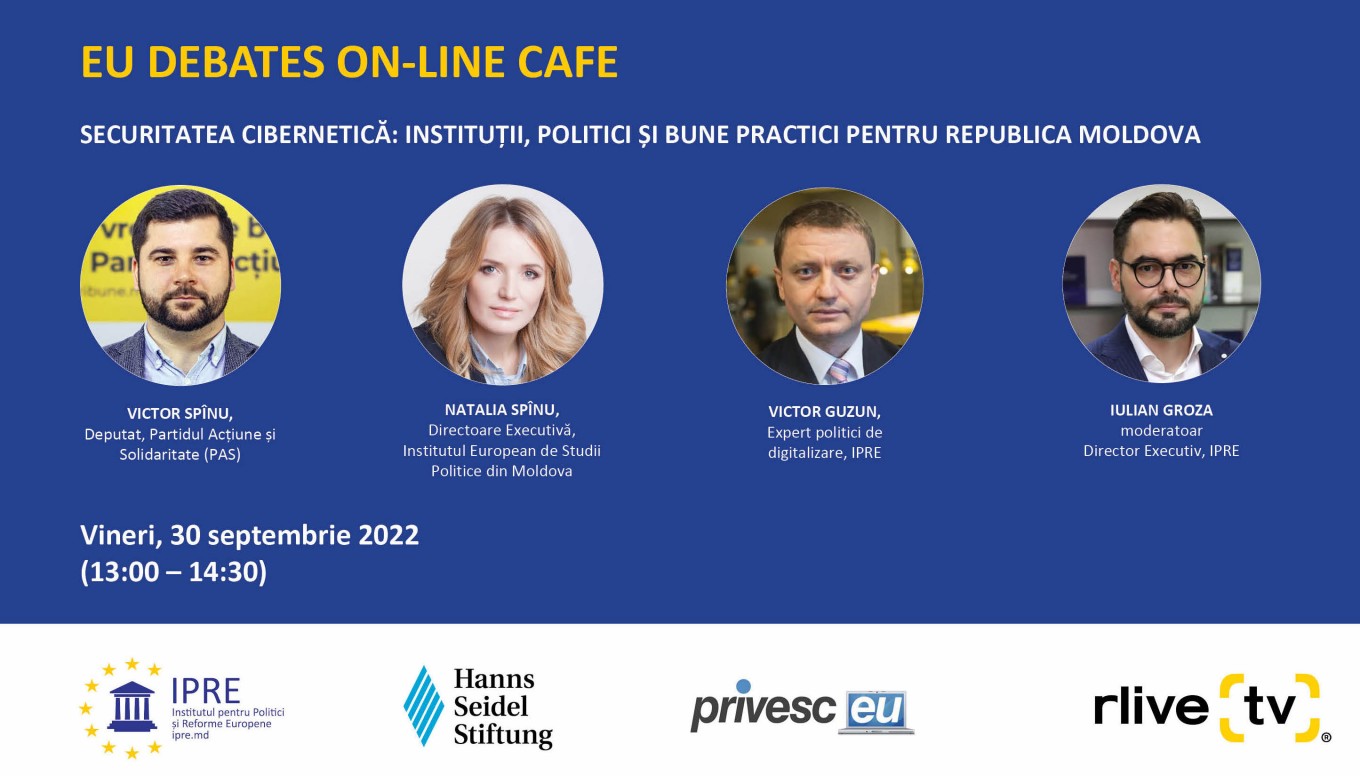#EUDebatesCafe: Cybersecurity: Institutions, Policies and Best Practices for Moldova

The Institute for European Policies and Reforms (IPRE), in partnership and with the support of the Hanns Seidel Foundation, organized on Friday, September 30, 2022, the sixth public debate of this year in the #EUDebatesCafe format, entitled “Cyber Security: Institutions, Policies and Good Practices for Moldova”.
The speakers at the event, which was moderated by Iulian Groza, Deputy Director of IPRE, debated the key issues related to the functioning of the institutional and policy framework on the cybersecurity dimension. At the same time, the best practices at national and European level for strengthening cyber security and the opportunities that can be exploited by the Republic of Moldova in the short and medium term were addressed.
Further below, we propose some of the main speeches of the speakers.
Victor Guzun, Digitalization Policy Expert, IPRE: “Digital Moldova is a new trend, and nowadays it is no longer just a priority or a specialization for someone. Any public service, Ministry, Agency, City Hall or public institution has or will have a digital component and the security element is online because it is a much broader process than cybersecurity. It is worth mentioning that the Republic of Moldova is in the process of developing a new national strategy of digital transformation that has a so-called “red line”, which means that no citizen should be excluded from this process of digital transformation, and the most important thing is that every citizen must benefit as a result of this digitalization. So, one of the 6 national priorities related to digital transformation, is about that topic being called as a secure digital ICT environment (cybersecurity), as this must be seen much broader than simply “cybersecurity”. Based on priority elements in the field of digitalization, it is worth mentioning that a project with the support of the European Union has been initiated, working on a concept of complex cyber governance from all perspectives. At the same time, emphasis is placed on the distribution of responsibilities by authorities and the identification of specialists with the setting of responsibilities for them and the development of cybersecurity skills of public sector specialists, the priority being also the logging into online systems with digital signature”.
Natalia Spinu, Executive Director, European Institute of Political Studies of Moldova: “Increasing the digitization of our society increases connectivity, because we all know that in fact this is the idea of the Internet and all these digital platforms and the use of all these new technologies leads to the aggravation of the risks for cyber security. As a society we are more vulnerable to cyber threats, and the dangers faced by authorities, economic operators and citizens are extremely high. Lately, the number and complexity of these cyber incidents has continuously increased, and the crisis situation in the region has highlighted this fact even more. This has posed a serious threat at national level to the functioning of information networks and systems, in particular to countries such as Romania and Ukraine, which are permanent targets with malicious actions aimed at affecting the confidentiality, integrity and availability of data or of systems and services that support the proper functioning of society and the economy. As a consequence of these incidents, important sectors of the national economy are affected and as a result, major losses can be generated or even lead to the materialization of risks to national security. This state requires a decisive, orderly and effective response as well as active cyber crisis management at national level, which are based on institutions, strong and specialised national authorities in the field of cybersecurity and specific policies in this regard”.’
Victor Spinu, MP for the Action and Solidarity Party (PAS): “The current government is a pro-digitization one, including due to the fact that there is also a Deputy Prime Minister at government level responsible for the digitization part. The creation of a digital infrastructure takes time and must be carried out with great responsibility. One of the problems existing in this chapter is the distrust of the population in these digital systems and this is due to the fact that the digital systems developed so far have been developed with great deficiencies from normality, there are systems that have been invested a lot but they create question marks regarding their security. At the same time, an acute problem faced by the authorities at the moment is to maintain and attract qualified specialists to work in state institutions, because of the low salaries compared to the private sector. Another problem is the maintenance of these information systems, which should still be carried out with the existing capacities at the level of state institutions, such as the e-Government Agency. A third problem is the sabotage by the management of some institutions, because this would reduce the level of corruption, which is not too convenient for some decision makers within the state institutions. I believe that communication is very important about the need to digitise certain processes, services that must be carried out, by requesting support in this regard, from development partners, such as, for example, Romania. It is also very important to recognize that we have a problem on this subject and it is necessary to turn to the community of experts for help by ensuring effective communication.”
For more details, you can watch the video of the event on the privesc.eu here and on Reality Live here.
The event was organized within the project “EU DEBATES CAFÉ: Advancing knowledge and expertise on EU institutions and policies in the Republic of Moldova”, implemented by IPRE, in cooperation with the Hanns Seidel Foundation in the Republic of Moldova and with the financial support of the Federal Ministry of Foreign Affairs of Germany.

